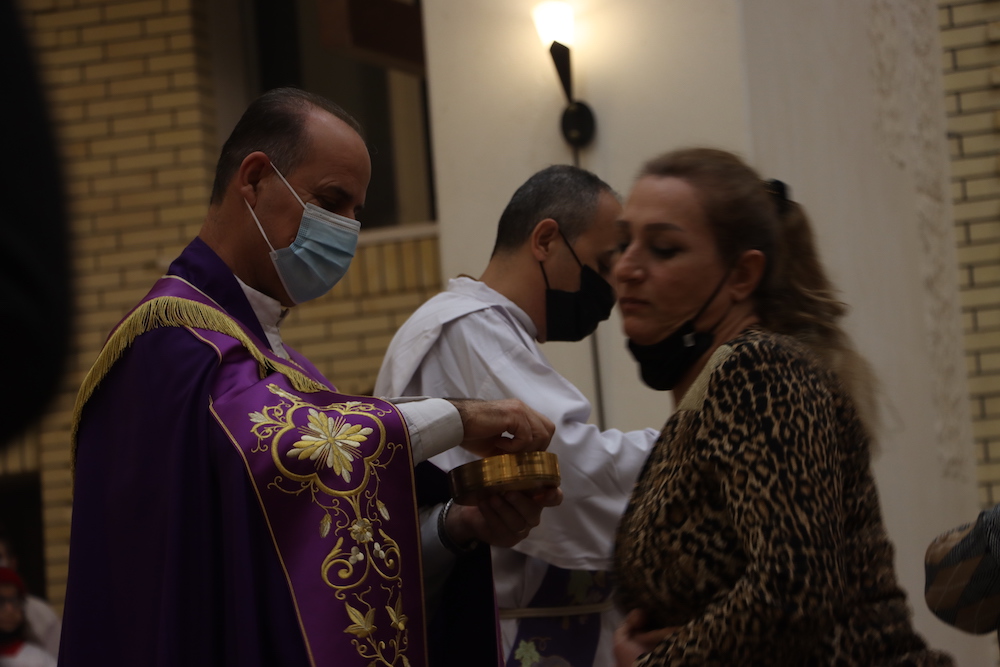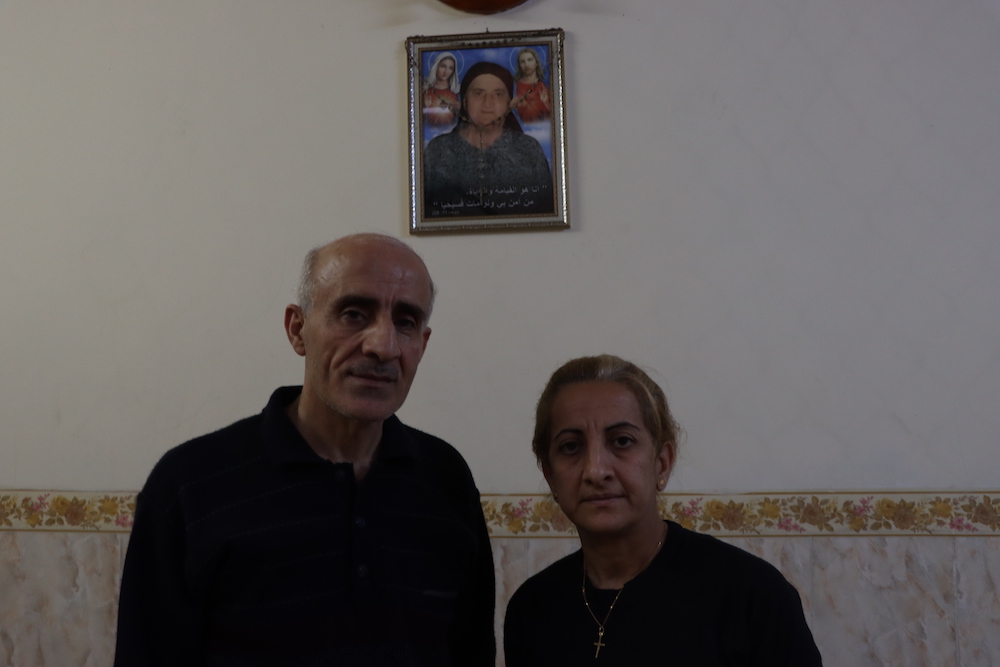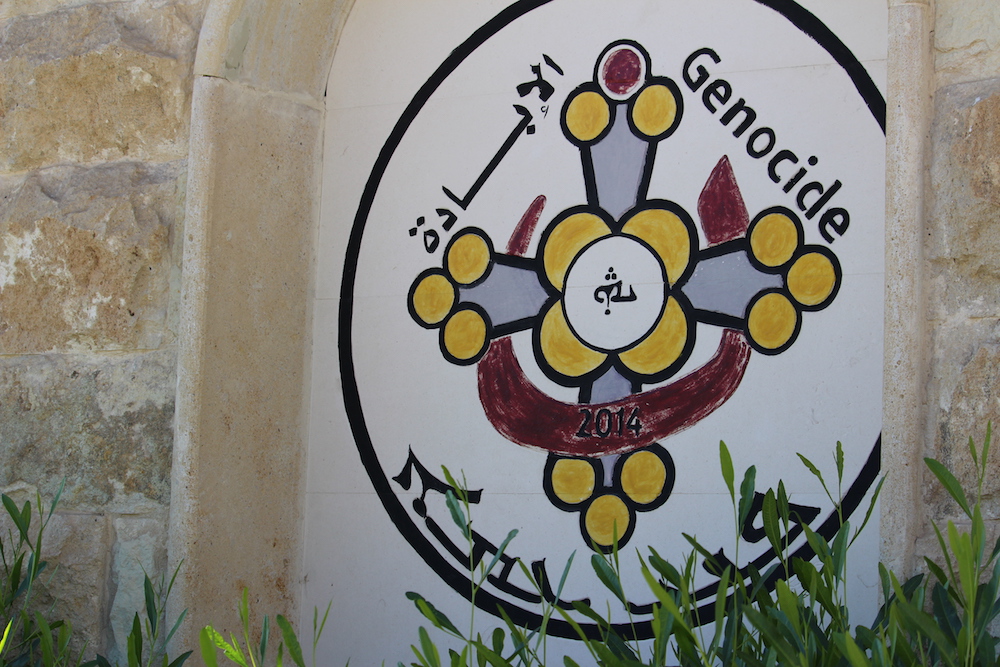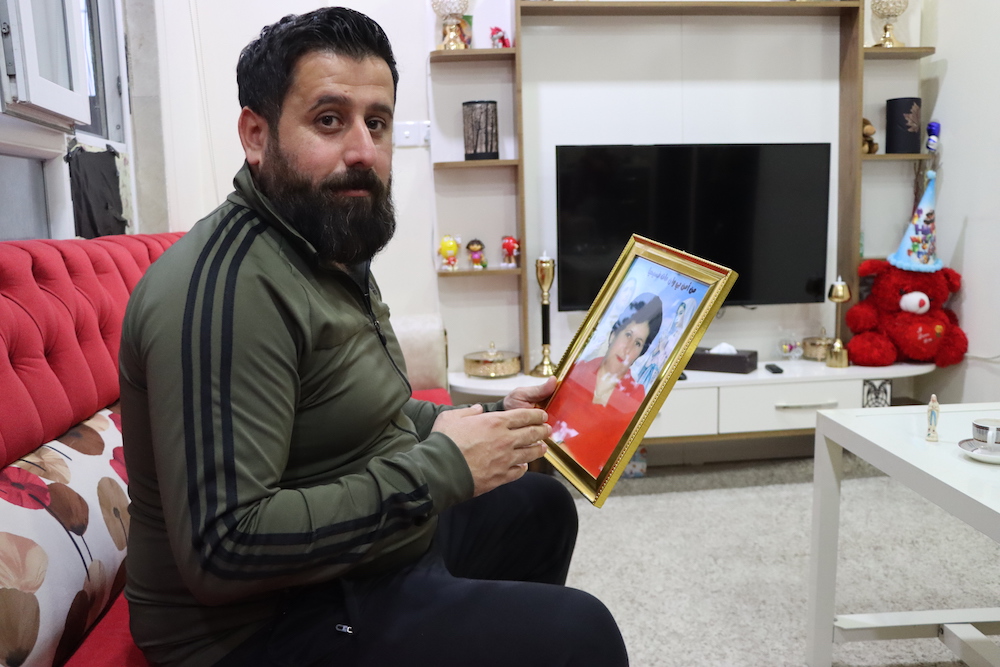IRBIL / MEXICO CITY: On a recent morning, as Sahar Ayoub gently turned the pages of her Bible, she contemplated the trauma that her family experienced when Daesh militants seized the northern town of Qaraqosh in the Nineveh governorate almost seven years ago.
She and her husband Ameer Bahnam were forced to flee with their three children when the extremist group launched its campaign of extermination against Iraq’s ethno-religious minorities in 2014.
Seated in her living room in Ankawa, a Christian-majority neighborhood in Irbil, Sahar, 50, expressed hope that Pope Francis’ visit to the main city of Iraqi Kurdistan on Sunday would offer her community the recognition she felt it had long deserved.
“Before, Christians in Iraq used to be valued and treated with consideration, no different from other Iraqis,” she told Arab News. “But that changed after 2003 when the new governments created sectarian divisions in the country between Muslims and Christians, and between Shiites and Sunnis.
“We are not free in Iraq as Christians. We can be judged for our rituals and what we wear. There is no freedom of religion for us in Iraq.”

Nashwan Hanna gives a sermon at Mar Elia Chaldean Catholic Church in the Christian-majority neighborhood of Ankawa, Irbil. (Kareem Botane)
Ameer, 57, said his family moved to the semi-autonomous Kurdistan region with the intention of eventually leaving for Europe. But after settling in Ankawa to take stock of the situation, they found something they had long hoped for — acceptance.
“I feel equal and safe here in Kurdistan,” Ameer said. “As a Christian there is freedom of religion.
“Christians in Iraq do not have full rights. We face oppression and we don’t feel comfortable practicing our rituals freely. But not in Kurdistan. In other parts of Iraq, we feel we are strangers and something is missing.”
After his meeting on Saturday in Najaf with Grand Ayatollah Ali Al-Sistani, the spiritual leader of Iraq’s Shiites, Pope Francis was scheduled to travel north to the Kurdistan region. Iraq’s religious minorities, free-speech advocates and political dissidents have long sought sanctuary here from persecution and violence in their home regions.

Francis was scheduled to hold Mass on Sunday evening before a crowd of 10,000 at Irbil’s Franso Hariri stadium, capped below venue capacity to allow for social distancing. For security reasons, Francis would be meeting with the general public during his entire visit on just this one occasion.
Kurds make up a significant proportion of Iraq’s 40 million-strong population. However, the lack of recent census data makes it difficult to ascertain the precise number of Kurds in the northern provinces of Irbil, Sulaimani, Duhok and Halabja that make up the lush and mountainous region.
Although relations between Irbil and Baghdad have long been rocky, coming to a head in late 2017 when the Kurds held a non-binding referendum on independence, Kurdish is recognized as Iraq’s second official language alongside Arabic, and all three of Iraq’s post-2003 presidents have been Kurds.
The Kurds carved out their self-administered region in 1991 under the patronage and air cover of the US-led coalition, which intervened at the tail end of the Gulf War to prevent Saddam Hussein from exacting his revenge on the Kurds for daring to rebel.
Having already suffered the cruelties of Saddam’s Anfal campaign and the infamous chemical attack on Halabja in 1988, the Kurdish people had little doubt that Saddam intended to wipe out them out unless the West took notice.
THENUMBER
1.5m
* Christian population of Iraq in 2003.
Although corruption and tribalism continue to mar political life in Kurdistan, the region, with its own parliament and presidency, battle-hardened Peshmerga security forces and culture of tolerance, compares favorably with federal Iraq, blighted by endemic sectarian violence and unrest.
It came as no surprise perhaps when a people touched by genocide readily opened their doors to the persecuted minorities of the Nineveh plains when Daesh stormed northern Iraq and took over Mosul in the summer of 2014.
Hundreds of thousands of Christians, Yazidis, Shabaks, Kakais and other minorities, alongside many thousands of refugees from neighboring Syria, poured through the Peshmerga’s checkpoints in search of safety.
Humanitarian aid agencies quickly arrived to accommodate the displaced in sprawling camps, while many Christians among them headed for Ankawa. Those with the means continued on to Europe and beyond.

Ameer Habib Bahnam and his wife Sahar Ayoub say they feel safe to practice their faith in Kurdistan. (Kareem Botane)
“I have applied for a visa to move to France, but until now I have had no news because of all that’s going on with the coronavirus,” said Ameer. “We wanted to go to France as my kids are scared to go back to our home in Qaraqosh. They are traumatized by what happened to us when Daesh came.”
Elaborating on the traumatic experiences, Sahar said: “Daesh burned and stole what was inside our house. After the liberation of Qaraqosh, we went there to check our house. Since then, we don’t want to go back. It’s not safe there now.
“If I met the pope, I would tell him he has to find a solution for the Christians of Iraq. We don’t have any rights here and I would ask him to get me out of the country. I don’t want to stay here. Either that, or he can make my town safe and assure my rights.”
Sahar and Ameer are not alone. Many Christian families have simply given up on the idea of leading a secure life in Iraq.
“Life for Christians in Iraq is all about living through war, without a future,” Juliana Nusrat, 28, told Arab News.
“I wish to meet the pope and tell him what we are going through. I want to tell him to take me out of Iraq. I lost my hope in Iraq. I don’t want to have more children in Iraq. There is no future here. I want my daughter to have a future outside Iraq.”

A memorial outside Mar Elia Chaldean Catholic Church in Ankawa, Irbil, commemorates the Iraqi Christians killed by Daesh in 2014. (Robert Edwards)
She and her husband, Gazwan Zuhair, 39, also came to Ankawa in 2014, escaping Daesh’s conquest of Mosul. “We left our house and everything we had behind and took only our IDs,” said Gazwan. “When the war was over, we went to see our house in Mosul. All our belongings were gone.”
Gazwan lost his job at the onset of the COVID-19 pandemic. Although the couple and their young daughter have struggled to get by, they have found a modicum of security in the Kurdistan region.
“We feel comfortable in Kurdistan. I can’t find a job here, but it’s safe,” he said.
“Kurdistan and the Kurds treat the Christians well and we feel safe here, but in the rest of the country, we are oppressed, especially in Mosul, where Christians were being threatened and blackmailed.
“As a Christian, I want to leave the country. Iraq does not offer me rights or work. Why should I stay? Maybe my life will be better in another country.”

Gazwan Zuhair, who lost his job at the start of the COVID-19 pandemic, says he and his family feel a modicum of security in Kurdistan. (Kareem Botane)
The flight of Iraq’s Christians to the West is a major concern for church leaders of all sects — Syro-Catholic, Syriac Orthodox, Armenian Orthodox and Chaldean alike.
Since the US-led invasion in 2003, the Christian population of Iraq had fallen from around 1.5 million to around 350,000-450,000 in 2014. With many now choosing exile abroad, their numbers have dwindled further.
“As a church, we do not encourage Christians to leave the country and leave their church to emigrate abroad,” Father Nashwan Hanna, 53, a priest at Ankawa’s Mar Elia Chaldean Catholic Church, told Arab News.
“We are an essential component of Kurdistan and Iraq. It is our home. We want to live in peace in our country and respect others and be respected.
“This visit, which will take the pope around Iraq, encourages us to stay. Our roots run deep in this land and this visit will encourage us to stay.”




































